- Home
- Evelyn James
The Missing Wife Page 2
The Missing Wife Read online
Page 2
The war had put a slight cramp on her style. Food was rationed, especially goods such as sugar and butter. Anything exotic, such as dried fruit, was virtually impossible to purchase. Annie had felt the restrictions the most when she thought about making a cake. Annie loved cake and she could make a sponge so light it seemed to float off the plate. Annie had felt bereft during the hard years of conflict, when she could not whip up a stunning fruit cake for a birthday or Christmas, at least not without a lot of effort in sourcing and stockpiling ingredients. Annie considered this one of Germany’s worst crimes – to deprive the nation of cake. She had been known to curse their name when considering her sugar supply.
Fortunately, that was all in the past. The war had ended, though for a couple of years certain goods were either still rationed or so expensive they were only affordable to the rich. Slowly prices were falling and it was now possible to buy dry fruit at a reasonable price, and Annie could have as much sugar and butter as she liked. For the dedicated cook, this was paradise.
Annie’s only slight niggle, (and it was truly slight) was that her cakes were largely indulged in by only Clara and Tommy, and of course Clara’s friend Captain O’Harris. While they were appreciative of her work, Annie had a desire to share her talents further. She wanted more people to taste her cakes and to be delighted. Annie’s mother would have called it pride. Annie didn’t care, she wanted people to know she was capable of making the best cake in Brighton.
Especially that Jane Jenkins who worked three doors down and had a habit of reminding everyone that she had won the best fruit scone prize for three years running before the war.
Annie had never won a prize for her cooking. She had never even entered a competition and Jane had a knack for bringing that up in most of their conversations.
It was a minor blip in the scheme of things, but it gave Annie the odd restless night. Which was why she had been truly jubilant when she read in the Brighton Gazette that the town’s spring gala would include a cookery competition. Prizes would be awarded to the best bread loaf, best meat pasty, best fruit cake and best Victoria sponge. Annie felt her eyes widen as she realised this was her chance to shove Jane Jenkins best scones, metaphorically, down her throat. Annie wanted to enter all the classes, sweep the board, but after the first flush of enthusiasm passed, she realised she ought to concentrate on one category and make the best effort she could on one single cake, rather than spread her talents over too many baked goods. She opted for best Victoria sponge, knowing that was her speciality.
The rules for the competition, as outlined in the newspaper, were stringent. Everything must be homemade, including the jam for the sponge. Annie thought that obvious; shop-bought jam was simply inedible, as far as she was concerned, and you could not possibly make a prize-winning cake with it. Annie had nurtured some strawberries in the Fitzgeralds’ garden and towards the end of the summer she had gathered them in great quantities to make a large batch of jam. She hastened to the larder after reading the newspaper announcement and confirmed to herself that two jars of that jam remained. Tommy loved jam on his toast in the morning and he went through Annie’s hoard like there was no tomorrow. She hid one of the remaining jars behind a large sack of flour. She knew Tommy raided her larder when he thought she was not looking – as if Annie did not have a full inventory in her head of everything on the shelves!
The jam secured, Annie went through all her other supplies. She had a great deal of flour, but she could run through that at surprising speed; pastry, bread and, of course, cakes, all required the staple and she used it up on a weekly basis. She decided she ought to buy another bag just to be on the safe side. The cake competition was in a couple of weekends, she would want to practice beforehand, just to make sure she was at her finest. Her sugar stock was running low and she made a mental note to shop for more. Eggs were supplied by the hens she had also introduced to the Fitzgerald garden, however, they could be fickle layers in the unpredictable spring weather. Annie decided to save their beautiful, golden yolk eggs for her cake, and buy in a supply of eggs for the household. That left butter, which Annie always sourced from a local farm.
Satisfied that she would have the very best ingredients for her cake, Annie went to work on a practice sponge. She had a stock of blackberry jam (the blackberries gathered from the bushes down by the railway embankment) which she would use for the filling. Deciding to be creative, she took an old apple from her store and cut it into slices. These she gently poached before laying them into the base of her sponge tin. When the cake was baked and turned over, the apples would be decorating the top. Apple and blackberry sponge sounded delightful.
Annie set to work creaming together her butter and sugar. It was a tough job that required a good deal of vigorous beating of the ingredients with a wooden spoon. Annie paced the kitchen back and forth as she worked, glancing out of the window at the sunlight in the garden. Spring always made her feel renewed and she took a deep breath and smiled.
The very next moment she came to a halt, let go of the spoon and pressed a hand to her side. She had a pain jabbing her, rather like a stitch from running too hard. She pressed her fingers deep into her side, forcing the pain to retreat. Slowly it eased. Annie shook her head. She must have pulled something, perhaps when she was cleaning out the chicken house yesterday. Going back to the satisfying work of creaming butter and sugar, she set to with her wooden spoon once more.
She was thinking of the look on Jane Jenkins’ face when she won best Victoria sponge. Her smile had returned. A second later so did the stabbing pain in her side. This time it was worse, forcing Annie to put down her mixing bowl and to stand with one hand clutching the edge of the stone sink, while the other pressed into her side. She tried to take a deep breath, but the griping pain wouldn’t let her. She closed her eyes and counted to ten.
Annie had had similar pains before. Once or twice as a girl she had been laid up in bed for a couple of days with an ache that felt like someone was stabbing her with a knife in the side. The pains had always passed and it was years since she had last experienced them. Now her biggest concern was that she might be forced to rest up, as she had been instructed by the doctor as a child. Annie was too busy to rest.
The pain retreated once more, but her side felt tender, as if it had left a bruise. Annie took a few moments after the pain had gone to restore herself. For the moment she felt unable to carry on with her cake making. She needed some fresh air.
Annie stepped outside into the back garden. The sun was warming this side of the house. She enjoyed the warmth falling onto her and relaxed further. The chickens clucked at her optimistically, they each had a name and Annie was convinced they all had unique personalities. She smiled at them and the pain seemed to drift into memory.
“Scared myself for a second there,” she told the chickens with a laugh.
Annie fingered her side, poking at the formerly sore spot to see if anything would happen. Nothing did. The mysterious pain had disappeared as fast as it had come. Annie was about to go inside when she heard her name being called.
Looking over the low fence that separated the Fitzgerald garden from the one next door was Mrs McGree. She was an older woman with grown children whose renown for knowing all the local gossip had ensured she and Annie were firm friends. Annie felt it was wrong to gossip about other people, so she never did it herself. But that didn’t mean she couldn’t listen to what Mrs McGree was saying. Listening to gossip and spreading it were two very different things. Besides, Annie could not be rude and ignore the woman, could she?
Annie strolled over to the fence.
“Good morning.”
“Fine morning,” Mrs McGree agreed merrily. “Have you had the paper yet?”
“I was just reading it,” Annie nodded.
“Did you see the notice about the cooking competition?”
“I did.”
Mrs McGree’s face burst into a big grin.
“Now there is a fine thing! I am entering the meat pasty class, I make a wicked beef and potato pasty. My husband says he could eat nothing but and be a happy man. Which class are you entering?”
There was clearly no doubt in Mrs McGree’s mind that Annie would be entering the competition.
“I was going to enter the Victoria sponge category,” Annie said promptly.
Mrs McGree rolled her eyes and tutted.
“Ach, you have entered the toughest class! You know, gal, everyone enters the Victoria sponge section.”
“I don’t mind competition,” Annie said, priding herself that she could outclass anyone else’s sponge making skills.
“That may be, but you know who else is entering that class?” Mrs McGree said.
Annie hesitated before saying;
“Who?”
“Only Miss ‘best scones of 1911, 1912 and 1913’ Jane Jenkins herself.”
Annie hesitated for only a moment.
“That doesn’t worry me, no one can beat my sponge.”
Mrs McGree smiled broadly again.
“That there is fighting talk, and I like to hear it! Me, I don’t care for such stiff competition. The meat pasty category will be under represented, I say, and most will opt for a standard Cornish pasty as their entry. I shall cook the finest beef and potatoes anyone has ever laid their gums upon, and the gentlest, tastiest of water pastries to encase them in. But you, my gal, you are setting yourself up for a big challenge.”
Annie was undeterred. The more people she had to go up against, the more satisfying would be the accomplishment of winning.
“Here, will you try one of my pasties when I have made them and give your honest opinion?” Mrs McGree said, a sudden look of uncertainty crossing her face. “Normally only Mr McGree eats them. You might spot something
he won’t.”
“I can do that,” Annie said. “We can do an exchange. I’ll try your pasties, you try my sponge.”
“Sounds perfect, now, I must get back to my washing. I have far too much to do, as always.”
They exchanged farewells and Annie headed back to the house, feeling revived and ready for action. If Jane Jenkins thought she could produce a better sponge than Annie, she was soon to discover she was sorely mistaken. Jane might have the way with scones – Annie would give her that, as she was not a fan of fruit scones – but she could not possibly have the ‘touch’ with sponge as well. No, Annie was certain she would win that category hands down.
Grabbing up her mixing bowl, she became to beat vigorously again. She only paused once, just to prod her side once more and see if anything happened. Nothing did. Whatever had caused the pain was gone. Relieved, Annie pounded the butter and sugar, humming to herself as she went.
In two weekends, she was going to show all of Brighton what her cakes were made of. She could hardly wait.
Chapter Three
Captain Chase had given Clara the name of the theatre group his wife had been rehearsing with. As far as he knew, they were the last people to have seen her before she disappeared. Chase could offer no clue as to why his wife might have voluntarily vanished; their marriage was happy and she seemed content. Clara knew, however, that what one person perceived as happy and content, could be a sign of misery and discontent in another. She was not ruling out the possibility that Mrs Chase had departed of her own accord, despite appearances suggesting to the contrary.
The theatre group was known as the Brighton Players and they had the use, as a theatre, of an old Methodist chapel. The seating for the congregation provided space for an audience and a specially constructed stage with wings at the head of the chapel gave the actors room to perform whatever they wished. Currently they were working on Macbeth. Captain Chase had been slightly dismissive of what he had seen when he went to the chapel to look for his wife.
“They have ‘updated’ it. Elaine said as much in a letter to me. It is no longer set in Glamis castle, but in a modern luxury mansion. I felt it had lost some of the atmosphere of the piece when I watched them. The stage was set with armchairs and a gramophone. Macbeth was wandering about in a dinner jacket and with a cocktail in his hand. It all seemed to be making a mockery of Shakespeare.”
Clara reserved judgement. She knew that actors, amateur or otherwise, liked to place their mark upon their work, and with a piece like Macbeth that could be difficult. She supposed that bringing it up-to-date was the way the Brighton Players were trying to make this rendition of the Scottish play different from all the rest. Whether it would work or not was another matter.
Captain Chase informed Clara that the players had only two weeks before their first night and were putting in extra rehearsal time. The disappearance of Lady Macbeth at such a crucial moment was causing a good deal of consternation. Her under-study had stepped in, but was proving forgetful in her lines and there was a slight panic she would not be ready for opening night. The group had been coming together in the late afternoon for further practice. Clara was hopeful she would be able to catch most of the group together at one of these.
She arrived at the chapel and pressed down the handle of the big wooden double-doors. They had been painted a bold blue with two theatrical masks – one sad, one happy – outlined in black. The door opened without protest and Clara stepped into the chapel. To accommodate a reasonable audience, the seating swept nearly to the doors. On a busy evening, with patrons trying to hurry to get in, Clara could imagine things getting rather tight. Directly in front of her was a central aisle that ran straight as an arrow down to the stage. People were on the stage going through lines. Others were sat in chairs near the front. Several looked around as she entered. Clara could see their puzzled looks; she was unexpected and unrecognised.
However, no one bothered to get up and see what she wanted, so Clara started down the aisle. She passed a woman who had a dress spread out on some chairs and a mouthful of pins. She glanced up at Clara without really seeing her, too busy with whatever alteration she was in the middle of. Clara gave her a polite smile nonetheless.
As she reached the front row of seats, a woman, who had been watching her progress, spoke up.
“This is a private rehearsal. The chapel is no longer open for worship.”
Her tone was snide. Clara ignored it and slipped into the seat directly behind her.
“I am not a Methodist,” she informed her politely. “I was hoping to have a chat with your group about Elaine Chase.”
The name caused several others, who had been concentrating on the stage, to now turn around. Clara counted fifteen people sitting in the front seats, on the stage were three others. The dresser further back up the aisle brought the total to nineteen.
“My name is Clara Fitzgerald. I have been asked to look into Mrs Chase’s disappearance.”
“Why would you do that?” The stern woman who had first confronted her demanded. She glowered at Clara like some sort of incensed watch-dog.
“I am a private detective,” Clara explained.
There were looks of uncertainty and surprise on the faces of the others. Some started to whisper to each other.
“Who are you?” Clara asked the woman before her. She had taken a dislike to her, but that did not alter the pleasantness of her tone.
“Wendy Cropper,” the woman declared. “Stage manager.”
“Were you around the last time Mrs Chase visited the players?”
“I was,” Wendy informed her. “It was one of our Saturday morning rehearsals. I can’t say we spoke. Her disappearing has made life very difficult.”
“For her husband, yes,” Clara replied, still polite but wanting to remind the woman that there was more to this drama than a play.
“Did you say you are investigating her disappearance?” An older man, sitting on the other side of the aisle, asked Clara.
“I am,” Clara told him. “I hope to discover where Mrs Chase is. Her husband hopes she is safe.”
“She has left him, of course,” Wendy Cropper snorted. “Could have waited until after the performance though. I protested her choice as Lady Macbeth, I said she was unreliable.”
Wendy Cropper appeared to be the spokesperson for the small band, for better or worse. No one else was countering her unpleasant opinions, though some looked grim.
“What mood was Mrs Chase in when you all last saw her?” Clara asked the group.
Wendy, of course, was the first to speak.
“Not a sign of anything. Quite the cold fish that one. Secretive, that’s it. She made no indication that she was going to run off. I find it disgraceful, she has left us in a dreadful position.”
Clara did not even respond, she glanced around at the others, hoping someone else would offer something more useful. They were all silent.
“Dear me!” Clara declared. “For a lot of actors you are very quiet! One of your number goes missing directly after a rehearsal and none of you have anything to say.”
“I…” Wendy started to bleat.
Clara interrupted her, smiling politely.
“I was not referring to you, you have been most forthcoming,” she said. “It appears no one else in your group has a voice, however.”
Wendy Cropper frowned, but she was too dense to take any offence at Clara’s words. She didn’t realise that Clara had been slyly inferring that her outspoken nature was overshadowing everyone else.
“Perhaps you do not want to speak up in public?” Clara suggested to the actors. “I tell you what. I shall go sit quietly at the back of the chapel, you carry on with your rehearsal, and if any of you want to have a private word with me you can come over.”
“I…” Wendy began again.
“Oh, my dear, I know you have no issue talking publicly and have already been most informative. Please do not feel you must depart from your work here to speak with me,” Clara said firmly.

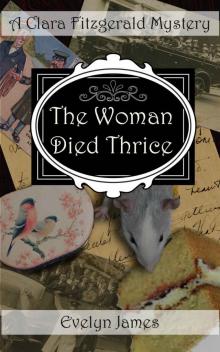 The Woman Died Thrice
The Woman Died Thrice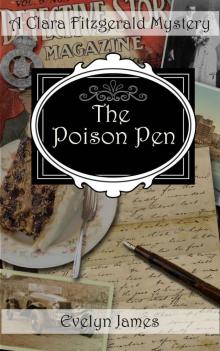 The Poison Pen
The Poison Pen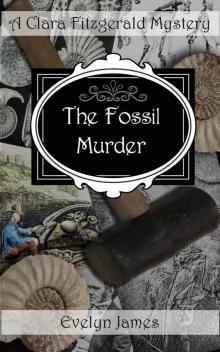 The Fossil Murder
The Fossil Murder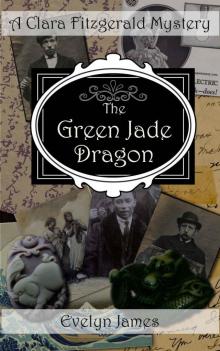 The Green Jade Dragon
The Green Jade Dragon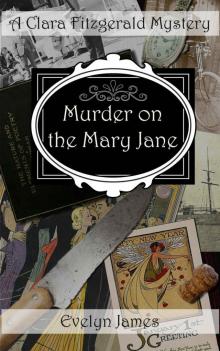 Murder on the Mary Jane
Murder on the Mary Jane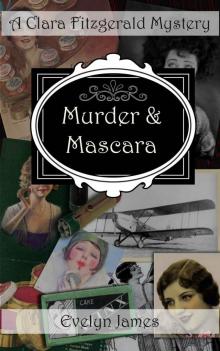 Murder and Mascara
Murder and Mascara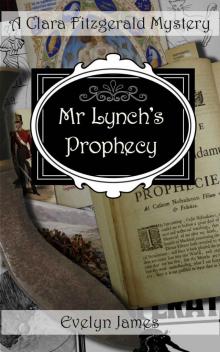 Mr Lynch's Prophecy
Mr Lynch's Prophecy The Traitor's Bones
The Traitor's Bones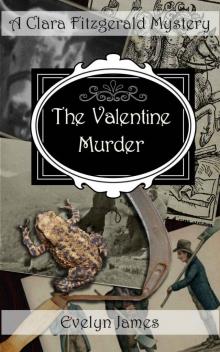 The Valentine Murder
The Valentine Murder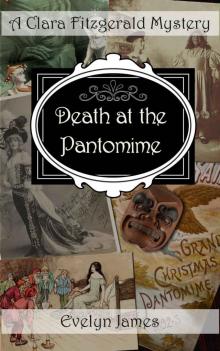 Death at the Pantomime
Death at the Pantomime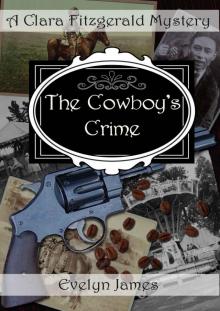 The Cowboy's Crime
The Cowboy's Crime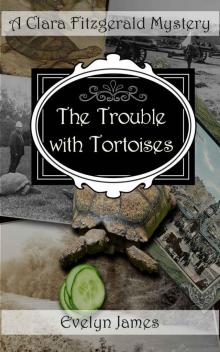 The Trouble With Tortoises
The Trouble With Tortoises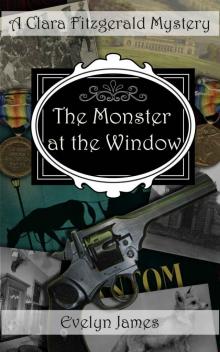 The Monster at the Window
The Monster at the Window